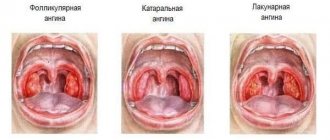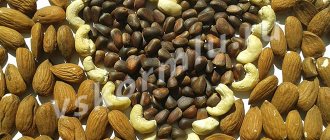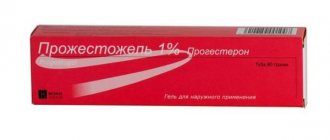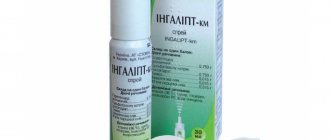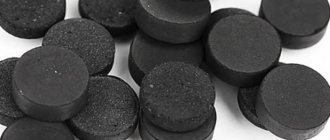Causes of pain
Women often experience a sore throat during breastfeeding. After childbirth, immunity decreases, and lactation sometimes creates a deficiency of vitamins and nutrients in the body.
Causes of sore throat:
- Viral infection. The most common cause of pharyngitis is inflammation of the laryngeal mucosa. Requires symptomatic treatment and usually goes away in 5-10 days.
- Bacterial infection. The main cause of acute tonsillitis (tonsillitis). The disease is accompanied by inflammation of the tonsils and throat mucosa. Treatment is carried out with antibiotics.
- Fungal infection. Candidiasis or thrush most often appears in infants, but sometimes occurs in adults. Treatment requires antifungal agents.
- Allergy. During pregnancy and breastfeeding, a woman's body becomes more sensitive. Treatment requires antihistamines and avoidance of contact with allergens.
Sore throat sometimes has a physiological origin. Irritation of the nasopharyngeal mucosa occurs with prolonged inhalation of dry air.
How to treat a cold in a nursing mother?
None of us are immune from various acute respiratory infections and acute respiratory viral infections, including during breastfeeding. Not everyone knows how to quickly cure a cold for a nursing mother, because often pharmaceutical products are not compatible with feeding the baby and can harm him, but treatment is still necessary.
How to treat a cold with folk remedies for a nursing mother?
The most harmless thing you can do to treat yourself while breastfeeding is the means and methods that have been proven over centuries. They are quite effective if you start using them at the very beginning of the disease.
Both external and internal use of medicinal products will help a nursing mother cure a cold. The following teas are suitable for coughs, sore throats and to reduce fever:
- raspberries;
- Linden;
- viburnum;
- chamomile;
- milk with soda.
All these drinks should be drunk warm, and for a better effect you can add a little honey if your mother is not allergic. Drops from Kalanchoe or beet leaves will help with a runny nose. The well-known black radish with sugar or honey is good for coughs.
You can steam your feet in hot water with mustard, but only if there is no fever. It is good to do steam inhalation with jacket potatoes and soda, as well as eucalyptus and chamomile. Gargling with decoctions of sage, string, and Rotokan solution will speed up recovery without harm to the body.
Medicines to treat colds
Many products that act locally are approved for use by nursing mothers. These are all kinds of tablets and lozenges for resorption - Efizol, Lizobakt, Laripront, as well as nasal drops, such as Pinosol Vibrocil, Protargol. You can rinse your sinuses with saline solutions like AquaMaris. Their concentration in the blood is negligible and they will not reach the child unless the dosage is exceeded.
For a cough, you can drink licorice root and herbal chest tea, and gargle with a solution of Furacilin, Miramistin or Chlorhexidine. Chlorophyllipt spray helps a lot. Sebidin lozenges will also help a sore throat.
If the temperature exceeds 38.5°C, then you should not endure it, but take an antipyretic drug in the form of Paracetamol, Panadol or Ibuprofen. Now you know how to treat a nursing mother with a cold. The main thing is to start all procedures on time, then the disease will soon disappear.
WomanAdvice.ru
Is it possible to continue feeding?
Some old-school pediatricians answer negatively to the question of whether it is possible to breastfeed if you have a sore throat. You can still hear recommendations to stop breastfeeding and temporarily switch the baby to formula.
GV specialists and modern pediatricians take a different position. They believe that it is possible and even necessary to continue lactation if the mother is ill. Frequent application will be a good prevention of illness in a child. Abrupt refusal of breastfeeding will lead to lactostasis.
If a mother has a sore throat while breastfeeding, her body is fighting the pathogens. Even before the first signs of a cold appear, a woman begins to produce antibodies. This occurs 5 days after contact with the infection. Protective particles recognize the pathogen and try to destroy it. During breastfeeding, these antibodies are transferred to the baby. They provide protection for the child precisely from the pathogen that caused the mother’s sore throat.
If a woman wants to protect her child, then she needs to continue breastfeeding. At the same time, the mother must maintain hygiene: wash her hands often, do not kiss the baby, it is advisable to wear a mask when interacting with the baby. This will not protect against infection completely, but will reduce the concentration of viruses.
Temperature and humidity
When sick, it is necessary to maintain humidity and temperature in the room. Since the patient’s condition worsens in dry air, the humidity in the room should be at least 50%. The optimal level is considered to be 60-70%.
Parents often make a grave mistake when preventing diseases in children. Moms and dads heat the room to 25-28 degrees so that the baby does not feel cold. In such conditions, the likelihood of infection is higher, since the bacteria are in a favorable environment. The optimal temperature for a children's room is 18-22 degrees.
To prevent infection of the child, it is necessary to ventilate the room more often. If possible, spend more time outdoors.
Features of throat treatment during lactation
During breastfeeding, the choice of means for treating the throat becomes very complicated, since the chemicals contained in medications, together with mother’s milk, can enter the child’s body, causing such negative reactions as allergies, poisoning, and disruption of the kidneys, liver and other organs.
It is also impossible to refuse breastfeeding. After all, it is with mother’s milk that the child receives substances vital for its development, as well as antibodies that help the small body cope with various diseases.
The first thing you need to do is call a doctor. After a thorough examination, he will prescribe the correct course of treatment, which will be most effective and also safe for the child.
Treatment
It is better if a doctor prescribes treatment for a throat during breastfeeding. After examining the mucous membrane, the therapist can guess what is causing the symptoms. With pharyngitis of viral origin, the body fights the pathogen on its own with the help of antibodies. Colds require simple treatments. Folk remedies, rinsing, and treatment with local antiseptic and anesthetic solutions help.
If the disease is bacterial or fungal in nature, more serious therapy is required. In this case, the doctor will prescribe approved antibiotics and antifungals to treat the nursing mother's throat.
You must inform your doctor about lactation. Most traditional cold medicines are prohibited. During breastfeeding, you can only take approved medications for sore throat (read about them below) or use safe folk recipes.

When are antibiotics needed?
Antibiotics for the throat during lactation are prescribed if the disease is caused by a bacterial infection. The drugs are prescribed by a doctor in individual dosages. Sore throat is often caused by streptococcus, which is more dangerous for a woman than refusing to take antibiotics.
The most effective treatment for tonsillitis is amoxicillin with clavulanic acid. Amoxiclav and Augmentin are prescribed for breastfeeding. If a nursing mother is intolerant to penicillin antibiotics, macrolides and cephalosporins are used.
Safe drugs:
- Sumamed;
- Rovamycin;
- Flemoxin;
- Cefazolin;
- Cephalexin;
- Suprax.
Sprays and aerosols
Sprays for sore throat give different effects: analgesic, anti-inflammatory, antiseptic. Many drugs have a complex effect. Topical medications work on the mucosa and are usually not absorbed into the bloodstream. Such drugs are considered safe because they do not pass into breast milk and do not enter the baby’s body.
- Miramistin in the throat during breastfeeding is prescribed for sore throat, pharyngitis, laryngitis and other diseases. The drug is an antiseptic that is effective against viruses, bacteria, and fungi.
- Hexoral has an antiseptic effect and accelerates the process of restoration of damaged cells. The spray anesthetizes and relieves swelling of the mucous membrane.
- Tantum Verde has a complex effect. The spray relieves pain, eliminates inflammation, and fights pathogens.
- Aqua Maris cleanses the throat mucosa and accelerates healing. The drug contains sea water. The spray can be used without fear during lactation.
- Bioparox is a local antibiotic. The drug is safe for women and children, but has been discontinued. If you still have Bioparox in your medicine cabinet, your doctor may recommend it.
During lactation, the doctor prescribes Ingalipt, Cameton, Lugol. These aerosols do their job well, but are prohibited for independent use. They contain several active components. This increases the risk of an allergic reaction. If possible, you should prefer single-component medications.

Tablets and lozenges
Lollipops and lozenges for sore throat help temporarily cope with sore throat. During lactation, doctors prescribe Lyzobact - lozenges. The drug has an antiseptic effect and is considered safe for mother and baby.
Effective remedies for pain and inflammation in the throat are lozenges: Strepsils, Septolete, Stopangin, Faringosept. However, modern doctors are skeptical about their use.
The drugs contain several components that can cause allergies. Some candies contain sweeteners and colorings.
Rinse
Regular gargling cleanses the mucous membrane and eliminates pathogenic microorganisms. To heal damaged cells, it is recommended to rinse the throat and tonsils with water with the addition of soda and salt. The disadvantage of such gargles is that they dry out the throat.
- Chlorhexidine effectively copes with bacterial infections. The drug has an antiseptic effect.
- Doctors recommend gargling with Furacilin. The tablet must be dissolved in 100 ml of warm water. Furacilin is contraindicated during lactation if the mother has hypersensitivity to the active substance.
Traditional methods
If a nursing mother has a sore throat, you can use unconventional remedies. During lactation, care must be taken, since even harmless home treatment can provoke dangerous consequences. Honey should not be used, as it is a strong allergen. Fruit drinks made from viburnum and lingonberries also remain prohibited, despite their effectiveness. In rare cases, lemon causes allergies in a child, and garlic affects the taste of milk.
Herbs for sore throat are only allowed for gargling. Chamomile, calendula, sage, and St. John's wort are used to prepare decoctions. It must be remembered that herbal remedies are allergens and can cause a reaction in a child. Therefore, you should not drink herbal infusions on your own. There will be no harm from rinsing.

What else can help?
Treatment of a nursing mother's throat should be effective and as safe as possible for both the woman and the child. Therefore, pay attention to simple and proven methods of treating infection - rinsing, inhalation and traditional medicine recipes.
Old and proven methods work great for a sore throat
Rinse
Follow these simple guidelines:
- In the first days of illness, try to rinse as often as possible, up to 12 times a day;
- The rinse solution should be warm, but not hot, so as not to irritate the inflamed mucous membrane. Try to cook it just before use;
- On average, half a glass of liquid is enough for one procedure;
- While rinsing, tilt your head back slightly and try to make a long “y” sound;
- The total duration of the procedure is 4-5 minutes.
- The course of treatment can last from 3 to 10 days, depending on how quickly the unpleasant symptoms in the throat disappear and the infection goes away.
Can be used:
- a solution of salt (1 tsp) and soda (1 tsp) per glass of water;
- decoctions of herbs (chamomile, sage, St. John's wort);
- fresh beet juice diluted with water in a 1:1 ratio.
Inhalations
They cope well with a sore throat and inhalation. Fine particles of water vapor soften and moisturize a sore throat and help clear the respiratory tract of infection. Perform inhalations before bedtime. You can breathe steam over a pan of hot water or the spout of a kettle.
To increase the effect of the procedure, instead of ordinary water you can use:
- decoctions of herbs (calendula, chamomile, marshmallow);
- potato broth;
- mineral water with a high alkaline content.
Inhalation is best done before evening rest
Doctor Komarovsky about colds of a nursing mother
Komarovsky recommends treating a nursing mother’s throat without medications. Of course, only if it is not a bacterial or fungal infection. The famous pediatrician adheres to modern principles of treatment. With viral diseases, it is impossible to speed up the process of antibody production and speed up recovery. Therefore, he sees no point in taking antiviral drugs.
Komarovsky recommends:
- drink more fluids;
- refuse food if you have no appetite;
- maintain comfortable temperature and humidity in the room;
- regularly ventilate the room;
- feed a child wearing a mask;
- wash your hands more often.
During breastfeeding, any treatment methods must be approached with caution. Those products that were previously used without fear can harm the child. Drugs that enter the systemic circulation inevitably pass into breast milk. Therefore, it is better to discuss taking medications for breastfeeding with your doctor.
Medicines to relieve sore throat
To reduce pain in the throat, the use of “Miromestin”, “Inhalipt” and “Iodinol” will help. On various forums for caring for babies, it is recommended to take sucking tablets for sore throats, which are widely available on the shelves of modern pharmacies.
When prescribing antibiotics to women who continue to breastfeed their children, doctors are of the opinion that if antibiotics do not harm the child, they do not pose a danger to his mother.
If a nursing mother takes antibiotics when treating flu and colds, then it is necessary to remember that these should not be sulfate-containing drugs, since they are poorly absorbed by infants. Antibiotics for women who are breastfeeding can be used while the baby is sleeping.
Symptoms
Clinical signs of laryngitis during lactation appear especially pronounced during the development of the pathology. Thanks to the symptoms, it is possible to identify the onset of the inflammatory process and begin treatment in a timely manner.
Signs of laryngitis:
- feeling of sore throat, rawness, dryness;
- the voice is hoarse, hoarse, sometimes completely disappears;
- At first, a dry cough symptom appears, then sputum begins to separate;
- the temperature rises to insignificant levels - 37.5 on average.
The new mother begins to feel weakness and malaise throughout her body. There is no appetite, sometimes there are pains in the head. To ease the symptoms, the doctor prescribes topical medications. Laryngitis in a nursing mother, treatment requires bed rest; the help of a second parent or relatives will be needed to care for the child.

Dry cough symptom.
